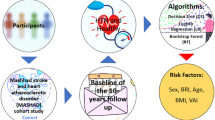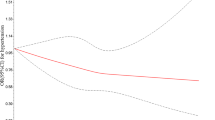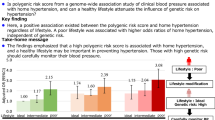Abstract
We examined the interactions between lifestyle and polymorphisms of salt-sensitive genes and their effects on hypertension in a general Japanese sample (The Shigaraki Study). The study group consisted of 2,902 subjects who underwent a medical examination in 1999 in Shigaraki, a suburban area in Shiga. Among 1,647 subjects not receiving antihypertensive medication, in a combined analysis of angiotensinogen (AGT) and adducin (ADD1) polymorphisms, double homozygosity of 235Thr or 460Trp was not found to be associated with hypertension. A multiple logistic regression analysis showed that age (odds ratio [OR]: 1.07, 95% confidence interval [95% CI]: 1.06–1.08), body mass index (BMI) (OR: 1.18, 95% CI: 1.13–1.23), alcohol consumption (OR: 1.39, 95% CI: 1.16–1.66), family history of hypertension (OR: 1.57, 95% CI: 1.18–2.07), and combined AGT M235T Thr/Thr and ADD1 Trp/Trp polymorphisms (OR: 1.37, 95% CI: 1.03–1.82) were associated with hypertension. However, there was no interaction between eating salty food and combined AGT and ADD1 polymorphisms. Furthermore, eating salty food was not associated with hypertension in a multivariate analysis. Therefore, a combination of the AGT and ADD1 polymorphisms appears to be associated with hypertension. However, a simple questionnaire regarding salt intake was not sufficient to confirm the relationship between salt intake and hypertension and/or salt-sensitive genes.
Similar content being viewed by others
Article PDF
References
Kunz R, Kreutz R, Beige J, Distler A, Sharma AM : Association between the angiotensinogen 235T-variant and essential hypertension in whites: a systematic review and methodological appraisal. Hypertension 1997; 30: 1331–1337.
Katsuya T, Ishikawa K, Sugimoto K, Rakugi H, Ogihara T : Salt sensitivity of Japanese from the viewpoint of gene polymorphism. Hypertens Res 2003; 26: 521–525.
Hunt SC, Geleijnse JM, Wu LL, Witteman JC, Williams RR, Grobbee DE : Enhanced blood pressure response to mild sodium reduction in subjects with the 235T variant of the angiotensinogen gene. Am J Hypertens 1999; 12: 460–466.
Schorr U, Blaschke K, Beige J, Distler A, Sharma AM : Angiotensinogen M235T variant and salt sensitivity in young normotensive Caucasians. J Hypertens 1999; 17: 475–479.
Beeks E, Janssen RG, Kroon AA, et al: Association between the alpha-adducin Gly460Trp polymorphism and systolic blood pressure in familial combined hyperlipidemia. Am J Hypertens 2001; 14: 1185–1190.
Cusi D, Barlassina C, Azzani T, et al: Polymorphisms of alpha-adducin and salt sensitivity in patients with essential hypertension. Lancet 1997; 10; 349: 1353–1357.
Tamaki S, Iwai N, Tsujita Y, Nakamura Y, Kinoshita M : Polymorphism of alpha-adducin in Japanese patients with essential hypertension. Hypertens Res 1998; 21: 29–32.
Yamagishi K, Iso H, Tanigawa T, Cui R, Kudo M, Shimamoto T : Alpha-adducin G460W polymorphism, urinary sodium excretion, and blood pressure in community-based samples. Am J Hypertens 2004; 17: 385–390.
Nakamura Y, Amamoto K, Tamaki S, et al: Genetic variation in aldehyde dehydrogenase 2 and the effect of alcohol consumption on cholesterol levels. Atherosclerosis 2002; 164: 171–177.
Amamoto K, Okamura T, Tamaki S, et al: Epidemiologic study of the association of low-Km mitochondrial acetaldehyde dehydrogenase genotypes with blood pressure level and the prevalence of hypertension in a general population. Hypertens Res 2002; 25: 857–864.
Tamaki S, Nakamura Y, Tsujita Y, et al: Polymorphism of the angiotensin converting enzyme gene and blood pressure in a Japanese general population (the Shigaraki Study). Hypertens Res 2002; 25: 843–848.
Bennett CL, Schrader AP, Morris BJ : Cross-sectional analysis of Met235→Thr variant of angiotensinogen gene in severe, Familial Hypertension. Biochem Biophys Res Commun 1993; 197: 833–839.
Sugimoto K, Hozawa A, Katsuya T, et al: alpha-Adducin Gly460Trp polymorphism is associated with low renin hypertension in younger subjects in the Ohasama study. J Hypertens 2002; 20: 1779–1784.
Luft FC, Miller JZ, Weinberger MH, Christian JC, Skrabal F : Genetic influences on the response to dietary salt reduction, acute salt loading, or salt depletion in humans. J Cardiovasc Pharmacol 1988; 12: S49–S55.
Miller JZ, Weinberger MH, Christian JC, Daugherty SA : Familial resemblance in the blood pressure response to sodium restriction. Am J Epidemiol 1987; 126: 822–830.
Hunt SC, Cook NR, Oberman A, et al: Angiotensinogen genotype, sodium reduction, weight loss, and prevention of hypertension. Trials of hypertension prevention, Phase II. Hypertension 1998; 32: 393–401.
Beeks E, Kessels AG, Kroon AA, Van der Klauw MM, De Leeuw PW : Genetic predisposition to salt-sensitivity: a systematic review. J Hypertens 2004; 22: 1243–1249.
Province MA, Arnett DK, Hunt SC, et al, for the HyperGEN Group : Association between the alpha-adducin gene and hypertension in the HyperGen Study. Am J Hypertens 2000; 13: 710–718.
Larson N, Hutchinson R, Boerwinkle E : Lack of association of 3 functional gene variants with hypertension in African Americans. Hypertension 2000; 35: 1297–1300.
Matsubara M, Sato T, Nishimura T, et al: CYP11B2 polymorphisms and home blood pressure in a population-based cohort in Japanese: the Ohasama study. Hypertens Res 2004; 27: 1–6.
Shioji K, Kokubo Y, Mannami T, et al: Association between hypertension and the alpha-adducin, beta1-adrenoreceptor, and G-protein beta3 subunit genes in the Japanese population; the Suita study. Hypertens Res 2004; 27: 31–37.
Tanaka T, Okamura T, Miura K, et al: A simple method to estimate populational 24-h urinary sodium and potassium excretion using a casual urine specimen. J Hum Hypertens 2002; 16: 97–103.
Author information
Authors and Affiliations
Corresponding author
Rights and permissions
About this article
Cite this article
Tamaki, S., Nakamura, Y., Tabara, Y. et al. Combined Analysis of Polymorphisms in Angiotensinogen and Adducin Genes and Their Effects on Hypertension in a Japanese Sample: The Shigaraki Study. Hypertens Res 28, 645–650 (2005). https://doi.org/10.1291/hypres.28.645
Received:
Accepted:
Issue date:
DOI: https://doi.org/10.1291/hypres.28.645
Keywords
This article is cited by
-
Association between a-adducin gene polymorphism (Gly460Trp) and genetic predisposition to salt sensitivity: a meta-analysis
Journal of Applied Genetics (2010)
-
Both angiotensinogen M235T and α-adducin G460W polymorphisms are associated with hypertension in the Japanese population
Journal of Human Hypertension (2007)
-
Genetics of salt-sensitive hypertension
Current Hypertension Reports (2007)



